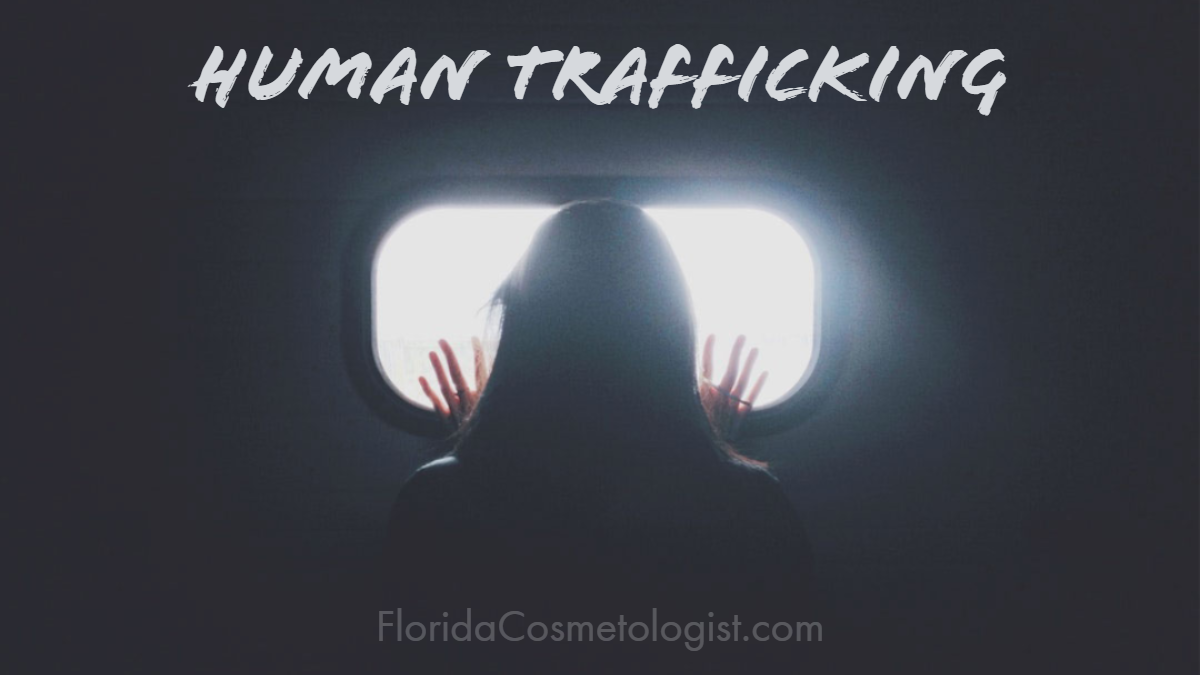
I was washing my hands at the gas station and looked up at the corner of the mirror. A sticker with “Text BeFree” caught my eye. Chances are, you have seen it too. You might wonder why this is important to you as a cosmetologist, esthetician, or nail tech.
BeFree is a human trafficking hotline that can save lives. In California, a 14-year-old girl was able to save herself and two others by texting a crisis hotline and giving out her location. This led to the arrest of three traffickers in a sex trafficking ring.
In June, Florida took one big step this summer to help trafficking victims in a number of other ways. Governor DeSantis signed House Bill 851 to combat human trafficking. Currently, Florida ranks as the third-highest human trafficking destination in the country. This includes both labor and sex trafficking. The effective date of this Law was 7/1/2019.
What does House Bill 851 do?
This law affects hotel employees, law enforcement, massage therapists, medical doctors, chiropractors, and more. It requires them all to take a 1-hour course on sex trafficking and labor trafficking. The course should include instructions on how to look for trafficking signs and who to contact in suspected cases.
This law does affect Florida massage establishments. So, if your salon is also a licensed establishment you should be aware of a few requirements. This includes:
- Human Trafficking Sign
- Designated Establishment Manager (DEM)
- Human Trafficking Reporting Procedures
- 1-hour Continuing Education Course for Massage Therapists
Read more details about the new massage establishment requirements here.
Does the new law affect licensed Florida salons, or those licensed by the Florida cosmetology board?
It does not appear so. I feel there was a missed opportunity not to include those licensed by the cosmetology board. Sex and labor trafficking also take place in licensed salons. I do not want to just single out nail salons, But push/pull factors like demand for cheap pedicures and quick employment opportunities for immigrants are adding fuel to the fire.
Snyder said Zhu told police she came to the United States to work in a nail salon with a promise of high pay. She said she started in a nail salon business in Chicago a few years ago. “After a period of time she found herself being forced into the sex trafficking,” Snyder said. – USToday Article
Lawmakers could have required licensed salons all to post a sign in our salon where all workers could see who to contact if they are in a labor or sex trafficking environment. This sign would be checked for during inspections. It could have been required in English, Spanish, Chinese, and Vietnamese. But that did not happen.
They could have also required those licensed by the cosmetology board to have a 1-hour human trafficking awareness course. But they didn’t.
We regulate massage in this town at a municipal level. The police department used to handle those duties, now the health department does it. We work together with them to do inspections. So it doesn’t take long for the crooks to figure out that the City doesn’t directly regulate cosmetology.
– Huffpost Article
A quick internet search on “human trafficking in salons” shows that this is a problem. Here are just a few examples:
Why You Should Be Involved
Currently, Texas cosmetology continuing education courses for cosmetologists (operators), nail technicians, and estheticians must include a component on human trafficking in order to get approved.
Ohio Cosmetologists are required to take a course on how to spot signs of human trafficking in their clients. This means more than 108,000 Ohio cosmetologists, who interact with thousands of people every day, are trained to spot human trafficking in their communities.
What if the 170,000 people licensed by the Florida Cosmetology Board were trained to spot human trafficking? What kind of impact could that make in the state?
And it isn’t just the client interaction you would notice either. Whether you are a cosmetologist, nail tech, or esthetician – you notice salons in a way most of the public does not. When you walk past them in the mall or the shopping strip next to your favorite taco or Chinese restaurant, you are more likely to notice when something is “off”. You may notice:
- A license isn’t posted where it should be
- The side or back entrance to the building that is often locked all the time
- Employees who do not seem properly trained?
- Only one person is handling the money
- The salon business is never busy (some are fronts for money laundering)
How to Help
If you have a client that is brought in to have their hair or nails done. Would ever consider their trafficker getting their appearance enhanced for forced sex trafficking? Would you know what signs to look for or who to contact? It is time we all know how to help.
Last year I had my 1-hour human trafficking course approved as part of the 10-hour renewal package for cosmetologists, facial, nail and full specialists. It is a 1-hour elective course.
This means cosmetologists, facial specialists (estheticians), nail specialists (nail techs), and full specialists can receive credit for this course and learn how to be part of the solution.
You can purchase our 10-hour Florida Cosmetology Continuing Education package for $20 and learn more about what you can do to help trafficking victims.
Massage Therapists can fulfill their 1-hour Human Trafficking Course Requirement on FloridaMassage.com.
To request help or report suspected human trafficking, call the National Human Trafficking Hotline at 1-888-373-7888 or text “help” to BeFree (233733).
Leave a Reply